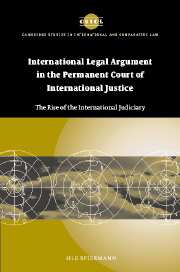 International Legal Argument in the Permanent Court of International Justice
International Legal Argument in the Permanent Court of International Justice Published online by Cambridge University Press: 17 July 2009
From the point of view of international courts and tribunals we live in paradoxical times. There is more activity than ever in the professional memory of the present generation of international lawyers. Some at least of the cases – not only before the International Court but also (and perhaps even more so) before the WTO Dispute Settlement Body, the various human rights and international criminal courts and the ad hoc tribunals and commissions – are of considerable importance. The cumulation of cases is developing the jurisprudence of specific areas of international law in a rapid way. And yet there is a pervasive sense that the whole ‘system’ is insecure, uncertain in its constitutional underpinnings, erratic in the political support for it and largely unrelated to key issues facing the world at this time.
This being so, a study of the foundations of international decision-making by the first permanent international court is of renewed interest. The Permanent Court of International Justice was not seen by its members or by governments as a prelude or an overture to something else; it was the beginning of a distinctive and permanent institution. It faced its own problems of the elaboration of international judicial technique and the development of the law amidst political uncertainty and a wavering mandate. Dr Spiermann clearly identifies the focus of the work as ‘the use of international legal argument outside the Buchrecht, that is, in practice’.
To save this book to your Kindle, first ensure [email protected] is added to your Approved Personal Document E-mail List under your Personal Document Settings on the Manage Your Content and Devices page of your Amazon account. Then enter the ‘name’ part of your Kindle email address below. Find out more about saving to your Kindle.
Note you can select to save to either the @free.kindle.com or @kindle.com variations. ‘@free.kindle.com’ emails are free but can only be saved to your device when it is connected to wi-fi. ‘@kindle.com’ emails can be delivered even when you are not connected to wi-fi, but note that service fees apply.
Find out more about the Kindle Personal Document Service.
To save content items to your account, please confirm that you agree to abide by our usage policies. If this is the first time you use this feature, you will be asked to authorise Cambridge Core to connect with your account. Find out more about saving content to Dropbox.
To save content items to your account, please confirm that you agree to abide by our usage policies. If this is the first time you use this feature, you will be asked to authorise Cambridge Core to connect with your account. Find out more about saving content to Google Drive.